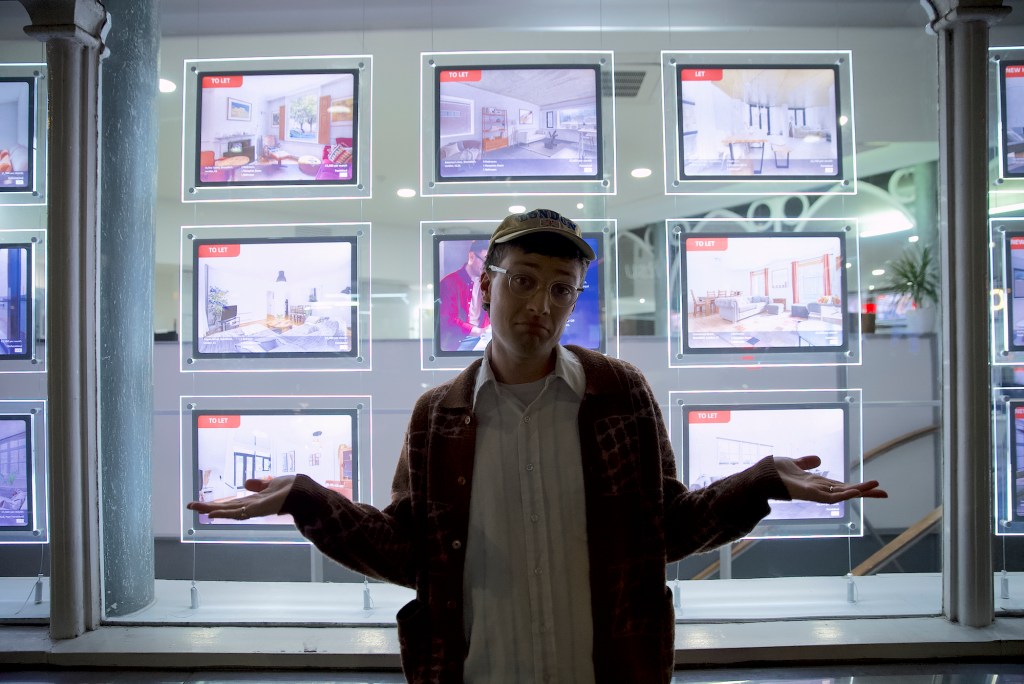“Housing is a human right, like food and water,” says Ali, holding up a protest placard he’s painted on a brown cardboard box. At times, Ali has struggled to access this human right, having lost many homes after fleeing various countries for his own safety.
After Ali arrived in the UK, he experienced homelessness with no recourse to public funds (NRPF), barring him from accessing help and welfare support such as universal credit, housing benefit and job seekers’ allowance. This discriminatory policy affects nearly 1.4 million people in the UK, according to research for Citizens Advice by the Migration Observatory at the University of Oxford. The organisation says it helped someone every 20 minutes with NRPF during the pandemic.
Videos by VICE
Now, Ali uses his voice to fight for people like him, advocating for everyone’s right to a home. “There are millions of people [like me],” he says. “People are escaping danger. They have lost everything they had – their country, their home, their parents, their friends – and they are coming here with hope.”
But they don’t know that housing in the UK is in crisis, he says. And the scale of the problem is hard to comprehend. Research by Shelter shows that 17.5 million people are trapped by the housing emergency, with millions denied a safe home, thousands of families stuck in temporary accommodation and thousands more people sleeping on the streets.

Ali believes the government could provide housing for people facing homelessness if they wanted to, not least because there are thousands of empty buildings across the country. Statistics published by the Ministry of Housing, Communities and Local Government show that there were 648,114 empty homes in England alone in October of 2019 – a 2.2 percent increase on the previous year.
Ali knows these empty buildings could provide a shelter for those without one, because he has seen it elsewhere. “When I was in Greece, I was homeless for a period of time,” he says. “I came up with an idea [of] hosting people in empty buildings. In six buildings, we hosted 500-something people.”
Ali is one of several young people using creativity and their voices to reclaim their power and surmount the potentially damaging repercussions of not having somewhere to call home.

Also among them is Francis, a singer-songwriter who was homeless for more than three years. “Everything important in your life starts from home,” he says. “And if that’s not safe and secure, then how will everything else be?”
Francis moved into a homeless hostel. Living there was not easy, but he had no other option. “I was working in a college doing IT. I would leave the hostel, and it almost felt like I stepped through a portal into the normal world, into the dimension I’m used to,” he says.
Writing music helped him to cope: it was the one constant when everything else around him was changing. “I’d be there sometimes for hours [writing],” he says. “Just in my own world … Everyone needs something that no one can take away from them. I create it, so no one can take that away from me. [Creativity] is my home.”

Like Francis, Krystalrose is a singer-songwriter. She and her young daughter could end up homeless, too, because they’re facing eviction after complaining to the landlord about the terrible conditions in which they’ve been forced to live.
She says the problem was “disguised” when they first moved in – everything was newly painted, and there was a fresh kitchen. But within months, damp started coming through the walls and everything started to get destroyed.
To protect their possessions, Krystalrose piles them up in the middle of the room, away from the damp and mould growing up the walls. “I’m trying my best to protect everything as much as I can,” she says. “I’ve got boxes and suitcases, and this is how we’re living.”
She complained, and instead of being told the problem would be fixed, she received an eviction notice. “I’ve received the date that they want me out. I don’t know what’s going to happen now. We just literally [thought], ‘Pack your bags, be ready because it’s coming.’”
For Krystalrose and her child, a safe, comfortable home means security. “I brought her into this world, and it’s my duty to protect her as her mother,” she says. “And this has been out of my control. I haven’t been able to protect her. I haven’t been able to pick her up and say, ‘OK, we’re going.’”
Finding some sort of escapism from the situation is far from simple, but Krystalrose writes in her bedroom, and she creates so much more than music alone. She started singing when she was five, and it’s everything to her, especially when going through tough times. “I’ve been listening to my music, and when I hear my voice, it reminds me who I am, how far I’ve grown, how far I’ve come, what I’m capable of, and I’m owning it,” she says, as her daughter dances to her tracks.
Krystalrose, Francis and Ali are all using their voices and creativity for change, and they won’t be silenced. “I will never stop fighting,” says Krystalrose. “I’ve not got that in me, to not fight, especially because I’ve got someone to fight for. I’ll do everything in my power to make sure that we do end up in a better home, in a safe home, in a comfortable home.”
More
From VICE
-

The author lurks outside an estate agents, Voigt-Kampff machine just out of shot. Photo by Zuka George -

Jesus, Mary Magdalene, Judas Iscariot, and some fourth wheel at the Last Supper (All photos by Paige Taylor White) -

Collage by VICE -

Collage by VICE

